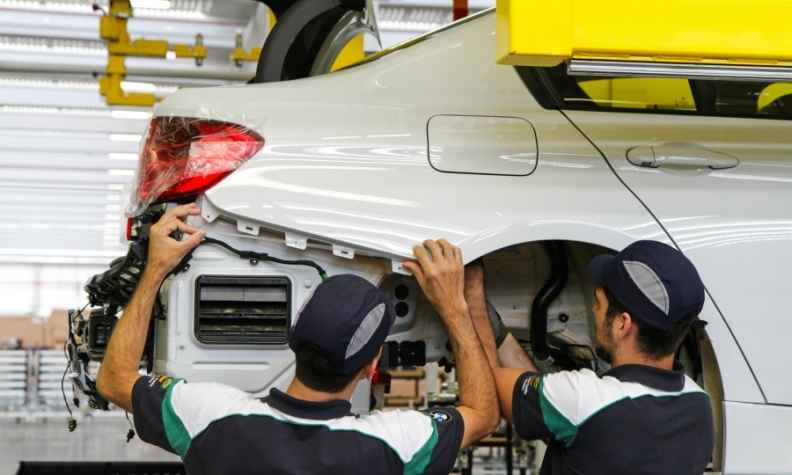SAO PAULO (Bloomberg) -- Carmakers are investing more than $30 billion by 2018 to expand or open more factories in Brazil than ever before, but that doesn't make the market a success story.

BMW spent $250 million on its first factory in Brazil, which started operating earlier this month and will reach annual output of 32,000 cars in three to four years. That compares with a $1 billion investment in a new factory to build 150,000 cars in Mexico by the end of the decade.
While Nissan and Mercedes-Benz are also planning plants in Brazil valued at $1.2 billion, they are spending $1.4 billion on a joint venture in Mexico next to a $2 billion Nissan factory that opened in November.
As the world's fifth-largest car market, Brazil is too big to ignore as gains among the middle class in the past decade fuel a surge in car sales. But high costs, poor infrastructure and few trade agreements mean Brazilian exports can't compete abroad, said Arturo Pineiro, CEO of BMW Group do Brasil.
That leaves carmakers setting up small factories here to meet internal demand, while building the bigger plants in countries such as Mexico, which has lower wages and trade agreements with 44 countries.
"Regrettably, costs in Brazil -- tax costs, labor costs, logistics costs -- are too high," Pineiro said in an interview in Sao Paulo. "Mexico is a much more open economy, much less protectionist, and it has bilateral accords with almost every country that counts."
Mexico
That mix is putting Mexico on track to overtake Brazil as Latin America's top automobile producer this year for the first time in more than a decade, fueled by factory openings as carmakers boost exports to the U.S., according to consultant IHS Automotive.
Car exports from Mexico rose to 1.95 million in the first three quarters, up 9 percent from a year earlier, according to the national auto producers' association, AMIA.
Brazil's figures show a different story: Exports in the first three quarters of the year fell to about 262,000, 39 percent below the year-earlier period, according to data compiled by Bloomberg.
While exports struggle, there's enough internal demand to lure carmakers here after 40 million Brazilians joined the middle class in the past decade, said Luiz Moan Jr., president of Brazil's auto-industry trade group, known as Anfavea.
There is one car for every 5.4 Brazilians, compared with a ratio of 1 to 1.3 in the U.S., he said. There are 1.7 people per car in France, Germany and Japan, and 3.7 in Argentina.
Brazil's 'potential'
Last year, 3.77 million vehicles were sold in Brazil, up from 2.46 million in 2007, according to Anfavea. "Everyone knows the potential of the Brazilian market," Moan said in an interview at Bloomberg's office in Sao Paulo. "Brazil is one of the few countries that, for geo-economic reasons, depends on its domestic market for growth. Other countries like Korea, China, Japan and Mexico chose to produce much more and export."
A weaker real and high taxes on imports are also making it more attractive to build Brazilian plants, Moan said. Many of the factories and expansions were announced in response to a tax increase of 30 percent on imported cars in December 2012, he said.
"It's Brazilian policy to close itself off from the rest of the world and lure manufacturers for the local market," said Augusto Amorim, an analyst for South America at IHS Automotive. "But I can't really see how Brazil can compete with other export countries."
Brazil's Trade Ministry didn't immediately respond to a request for comment.
Jaguar, Fiat
But despite the problems, carmakers are clamoring to invest in the Brazilian market.
Jaguar Land Rover plans to begin production of the Land Rover Discovery Sport in 2016 at its $307 million factory in Itatiaia, in the state of Rio de Janeiro. Fiat Chrysler Automobiles will build a 200,000-capacity factory starting with output of the Jeep Renegade next year in the northeastern state of Pernambuco. This month, BMW Group opened a plant making the 3-series sedan in the city of Araquari in the southern Brazil state of Santa Catarina. Nissan and Mercedes too will build 220,000 vehicles a year at separate plants in Brazil in addition to their joint Mexican venture, which will produce 300,000 units as of 2017.
Poor infrastructure is among the problems that make Brazil less competitive, said Jose Luis Valls, senior vice president of Nissan's Latin America business.
"Brazil needs to be competitive -- if you're not competitive, you don't grow," Valls said in an interview in Sao Paulo. "Brazil needs to do it's homework" regarding the development of its infrastructure.
